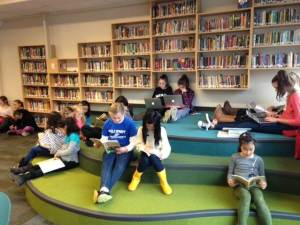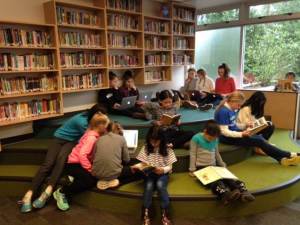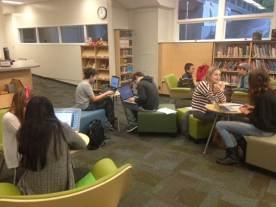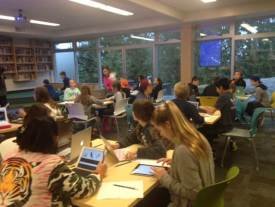
If you read other edu-bloggers, you will have likely seen these posts that are spreading. I had shied away from doing one myself, but it was only a couple of posts ago I committed myself to becoming more involved in the education blogging community. How it works is colleagues in your network “tag you” with a homework assignment to share 11 random facts about yourself, and then answer the 11 questions provided, and then invite 11 others to answer 11 questions asked of them.
I am somewhat skeptical — it sounds like a pyramid scheme. I know when I was seven I was supposed to send five postcards to people I knew and within three weeks I was going to get 400 postcards from people around the world — my mom said I wasn’t allowed to do it.
I have been “tagged” twice, so below my facts are answers to both sets of questions.
11 Facts About Me:
1) I love routines. I know that is not considered to be a good thing by many, but even on vacation I love a schedule with a sense of tasks being accomplished.
2) I have a geographic tongue — this feels like over sharing, but only about 1% of the population have one.
3) I would prefer to speak in front of 500 people than make small talk in a room of 10.
4) I was 39 years old before I travelled outside of North America.
5) My wife and I went to the same high school but didn’t know each other (she was one year older); she may have been a little bit “cooler”. We started dating when we on the staff together at that same high school and I was assigned to be her “mentor”. After we were married we taught on the same staff for one year before I took a job in Coquitlam. I also spent one year – my first year – teaching on the same staff as my mom.
6) Last spring break our family filmed an episode of the Property Brothers – Buying and Selling. It starting airing on HGTV in the United States on January 1st and starts airing in Canada on January 7th on the W Network. We learned a lot about how “real” or “not real” reality TV really is.
7) I am in my 26th year of being involved with coaching basketball / basketball administration — my first coaching assignment was in 1988, coaching the Grade 7 boys at Woodward Elementary School in Richmond.
8) I loved playing the saxophone in high school, but now I regret that I never really learned to play the piano.
9) I feel a connection to West Vancouver because my grandfather taught at West Van Secondary in the late 1930’s and early 1940’s.
10) My peak weight was 248 pounds but I have spent the last 20 years weighing about 195 pounds.
11) I know that this trait is really not that popular these days in schools, but I am very competitive and I really like to win.
Questions from Johnny Bevacqua
1. What keeps you up at night? My four-year-old daughter — she is still not keen on sleeping through the night in her own bed
2. What would you consider comfort food? All-you-can-eat sushi
3. What is one thing you would change about your job? My house and my job are too far apart – I would make them closer together
4. What is one thing you would change about schools today? Stop valuing some courses (e.g. sciences) more than others (e.g. arts and trades)
5. What is one piece of advice you would give to someone? Go for it — there is always another job
6. The biggest inspiration in my life is___________________? My wife — she is awesome!
7. What was the first music concert you attended? Probably Fred Penner. Without my parents, I think it was Harry Connick Jr.
8. What is the first movie you attended? Swiss Family Robinson
9. Other than work, I have a passion for_____________________? My family
10. If you wrote a book, what would the title be? Either “Go Where the Kids Are” or “Just Win Baby!”
11. When I grow up I ______________________ will just be a big kid.
Questions from Tia Henriksen
1. What are your favourite and least favourite colours? Favourite — blue; least favourite — brown
2. What was your favourite subject / least favourite subject in school? I loved History 12 and never liked (or was very good at) Art
3. Where were you born? In a hospital
4. What was your lowest grade in your post-secondary classes? In what class? C in Urban Geography of Thailand (poor course choice)
5. What is the best characteristic you received from your mom? Appreciation for traditions
6. What is your favourite childhood memory? Spending time in Naramata, and later in Penticton, with my grandmother every summer
7. How old were you when you learned to swim? Probably about five – we did lessons every summer at South Arm Pool in Richmond
8. Is Disneyland really the Happiest Place on Earth? YES — I love theme parks and I like to have the entire day planned out
9. What’s your favourite video you’ve watched recently on social media? Dean Shareski’s TEDx Talk from last spring
10. If you could plan it, what would your last meal consist of? Sushi and lemonade
11. What makes you happiest? Watching my kids play sports
11 Random Questions for You:
1. If you could only watch one television station what would it be?
2. Looking back at your schooling, what was the silliest rule your school had?
3. Who is the greatest ever Canuck?
4. What is the greatest rock group of the 1980s?
5. What is something education related you have changed your opinion on over your career?
6. What is the warmest place you have ever been — and how warm was it?
7. Poorest fashion trend you have seen in schools in the last 10 years?
8. What was more frustrating to deal with in your school — Pokemon cards or silly bands?
9. Describe your favourite high school teacher in four words
10. What is the best reason to go on Facebook at least once a day?
11. If blogging was outlawed tomorrow — what would be your reaction?
I Challenge the Following People to do their Homework:
I know it is a bit of a cop-out, but I will challenge all of those bloggers in the West Vancouver School District community to consider giving this activity a try. I will not call you out by name, but hopefully some of our Trustees, Principals, Vice-Principals and Teacher bloggers will take this on — and then, maybe challenge some of our student bloggers to do the same.
Read Full Post »
 otics just over 3-years ago (HERE) as our then new Robotics teacher was taking his show on the road to various elementary schools sharing his passion about robotics.
otics just over 3-years ago (HERE) as our then new Robotics teacher was taking his show on the road to various elementary schools sharing his passion about robotics. hall from one another, with two teachers and every student was fully engaged. Here are some of the specifics:
hall from one another, with two teachers and every student was fully engaged. Here are some of the specifics: I often get asked, What does student engagement look like? It looks like 60 students working together with teacher support on short-term and long-term goals. It was crazy. And the photos I have included in the post only do it partial justice. When people say that students today just do what they are told, lack initiative, are micro-managed by their parents and are not gaining real world skills – I call BS. I have so many great examples that tell me something different, and anyone who has seen our robotics students in action know the kids are going to be OK.
I often get asked, What does student engagement look like? It looks like 60 students working together with teacher support on short-term and long-term goals. It was crazy. And the photos I have included in the post only do it partial justice. When people say that students today just do what they are told, lack initiative, are micro-managed by their parents and are not gaining real world skills – I call BS. I have so many great examples that tell me something different, and anyone who has seen our robotics students in action know the kids are going to be OK.













